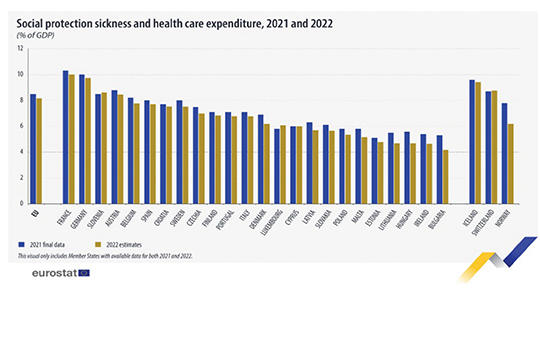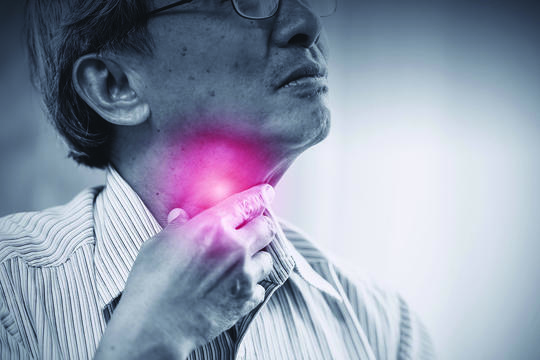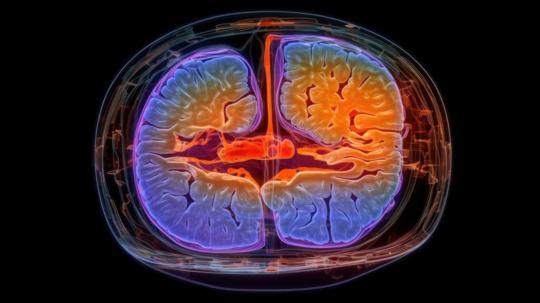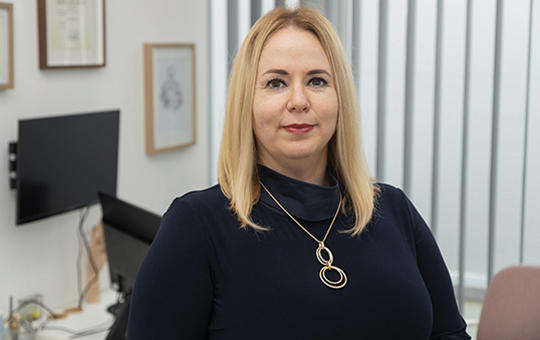The eLitMed.hu medical portal uses computer cookies for convenient operation. Detailed information can be found in the Cookie-policy.
Lege Artis Medicinae - 2023;33(12)
Content
[Hypothyroidism of the elderly – To treat or not to treat? ]
[Hypothyroidism is common in the elderly. Frequent causes of hypothyroidism include autoimmune disease of the thyroid gland, previous thyroid surgery and radioiodine therapy. Symptoms may be atypical, and the level of serum thyroid-stimulating hormone (TSH) must be measured as a part of the biochemical workup. Elevated serum TSH levels have to be confirmed with a repeated tests, which must be completed by measuring the serum thyroxine level too. The recommended and relevant replacement therapy for hypothyroidism is levothyroxine sodium administration. Levothyroxine sodium is orally only partially absorbed since it is affected by food, minerals, drugs and the composition of the tablet. The initial hormone replacement dose should be low if any heart disease is suspected. The main risk of levothyroxine sodium therapy is its over supplementation, the side effects of which may include anxiety, muscle atrophy, osteoporosis, and atrial fibrillation. Subclinical hypothyroidism with elevated serum TSH level but with a T4 level in its reference range may be considered as a mild form of hypothyroidism. Studies published so far did not prove the positive effect of substitution therapy for non-goitrous subclinical hypothyroidism, especially in elderly patients.]
[The impact of end-of-life spirituality on the quality of life – Scoping review]
[By nearing death, patients face more difficulties as they confront with their own transience, with ultimate loss of their life. Among all multidimensional needs of dying people, end-of-life spirituality has received increasing attention in scientific research during the recent decades. The aim of this study is mapping the impact of end-of-life spirituality on the quality of life as reflected in the relevant literature, and to present the scientifically significant key definitions and measurement options by their difficulties.
Review of English-language papers published after 2017, searched in PubMed and PsycINFO databases using the PRISMA-ScR protocol, with scoping review method, that investigate the impact of end-of-life spirituality. In addition, there was also supervised a review of the authors’ unpublished literature review on the same topic conducted in 2016.
A total of 59 articles were identified by the database searches. Only 2 of the previous review papers were applied here. Each reviewed paper was generally positive about the impact of end-of-life spirituality on the quality of life. Two papers mention a possible negative effect of spirituality on certain factors of the quality of life.
Semantic concerns and measurement difficulties of this topic cause discrepancies in evaluating the study results. Further research of practical spirituality should be valuable to clarify which components may cause negative coping experience in the patients.]
[Gynaecological hormone therapy and the cardiovascular risk. Part 1: hormonal contraception]
[Preventing unwanted pregnancy, and in treating many gynaecological diseases, we use hormones produced by the ovaries, namely the follicle hormone and the corpus luteum hormone, or their synthetic versions. In terms of hormonal therapies, combined oral hormonal contraception and menopausal hormone therapy are of outstanding importance. Some pharmaceuticals do not increase the cardiovascular (CV) risk, while others do it by increasing the risk of coronary diseases (primarily myocardial infarction), venous thromboembolism, and ischaemic and haemorrhagic strokes respectively. This review of concerning literature summarized the cardiovascular impact of hormonal therapies in gynaecologic practice, in two parts. The first part discusses hormonal contraception, the second one the menopausal hormone therapy.
Combined hormonal contraceptives (COC) containing follicle hormone and progestogen significantly increase the risk of venous thromboembolism (VTE), however without any major clinical significance. The higher risk perceived among smoking, overweight and older women is additionally burdened by COC. Nevertheless, products containing estetrol and progesterone-only-pills do not increase the CV risk. Using COC does not increase the risk of haemorrhagic stroke, but does it slightly that of ischaemic stroke and myocardial infarction. CV side effects of hormonal ACs are not significant from a clinical point of view and are far below the complications caused by unwanted pregnancies due to the use of improper contraception. This study summarized the literature data on CV risk of hormonal contraceptives. ]
[Female specific differences of ischemic stroke and cerebral venous thrombosis]
[There are female-specific characteristics also in epidemiology, emerging risk factors, acute reperfusion therapy and outcome of cerebrovascular disorders. Among classical risk factors, as hypertension, atrial fibrillation, diabetes and obesity the risk of stroke is higher in females than males. Recognizing female specific risk factors is indispensable not only in therapeutic but also in preventive measures. Pregnancy and puerperium increase the prothrombotic state which results in a significantly higher incidence of ischemic stroke and cerebral venous thrombosis respectively. The treatment of acute stroke in pregnancy and puerperium is a great challenge since the concerning guidelines providing hardly any conduct in such cases. After menopause, there is change in prevalence and severity of cardiovascular risk factors and as a result, the stroke incidence is higher among females than males over the age of 80. Additionally, there are evidence based sex differences in the stroke outcomes. This review aims to improve the stroke care quality by presenting characteristic sex differences in this summary. ]
[How to find the balance between patient screening and lifestyle management of already recognized cases? ]
[This opinion for starting a debate reviews the evidence available about specific cardiovascular prevention strategies. It draws attention to the documented limitations of preventive screenings, and the proven effectiveness of lifestyle interventions in confirmed cases. It highlights the fact that the efficient support of lifestyle changing as a preventive strategy should be more emphasized since controlling the 21st century’s civilizational diseases decisive in terms of public health can only be achieved by a balanced activity.]
[Digitalization in healthcare: usage habits, attitudes and needs of patients and doctors over 65 concerning digital health in Hungary]
[The development of digital health has accelerated significantly in recent years, but often the most vulnerable groups, including the elderly, are missing out on the most advanced digital technologies.
In our exploratory research, a national, representative questionnaire-based patient survey of the adult Hungarian population was conducted in autumn 2021 (N=1723), 428 respondents were aged 65+. Out of the 1576 GPs completing the online survey of doctors working in Hungary between July 2021 and May 2022, 435 were aged 65+. The data were analysed descriptively and by cluster analysis.
While the likelihood of patients using the internet decreases with age, doctors over 65 years of age are significant daily users (88.5%). More than a third of older doctors (37.2%) and half of younger doctors (50.3%) are more likely to support their patients’ use of the internet for health purposes. Educational attainment is a determining factor in patients’ use of digital technologies. Virtually all of the elderly who use the internet have heard of digital health solutions and nearly 70% have used at least one type of digital communication, administration or device solution.
Although elderly patients are disadvantaged in their use of digital tools, their openness to the future is encouraging: 70% of them would like to try digital technologies. Older doctors are also open to new solutions, and although they are more cautious about the benefits of digital health, there is no age gap in terms of disadvantages.]
[The role of brain neural networks in the developing dementia: our research methods from optogenetics to artificial intelligence]
[In the Laboratory of Systems Neuroscience of the Institute of Experimental Medicine, our main objective is the better understanding of the brain mechanisms of cognitive functions. We investigate the nervous system basis of learning, memory, attention and decision-making not only in normal conditions but also in pathological ones, especially concerning the neurodegenerative dementias such as Alzheimer’s and Parkinson’s disease.
Our main profile is conducting animal studies, but we carry out human research too in collaboration with clinical partners. We analyse multichannel, i.e. multidimensional electrophysiological signals using both classical and modern statistical methods and new and powerful machine learning algorithms.
This study presents the activity of our team, while focusing on artificial intelligence applications.
]
1.
Clinical Neuroscience
Is there any difference in mortality rates of atrial fibrillation detected before or after ischemic stroke?2.
Clinical Neuroscience
Factors influencing the level of stigma in Parkinson’s disease in western Turkey3.
Clinical Neuroscience
Neuropathic pain and mood disorders in earthquake survivors with peripheral nerve injuries4.
Journal of Nursing Theory and Practice
[Correlations of Sarcopenia, Frailty, Falls and Social Isolation – A Literature Review in the Light of Swedish Statistics]5.
Clinical Neuroscience
[Comparison of pain intensity measurements among patients with low-back pain]1.
Clinical Neuroscience Proceedings
[A Magyar Stroke Társaság XVIII. Kongresszusa és a Magyar Neuroszonológiai Társaság XV. Konferenciája. Absztraktfüzet]2.
3.
Journal of Nursing Theory and Practice
[A selection of the entries submitted to the literary contest "Honorable mission: the joys and challenges of our profession" ]4.
Journal of Nursing Theory and Practice
[End of Life and Palliative Care of Newborns in the Nursing Context]5.
Journal of Nursing Theory and Practice
[Aspects of Occupational Health Nursing for Incurable Patients ]














